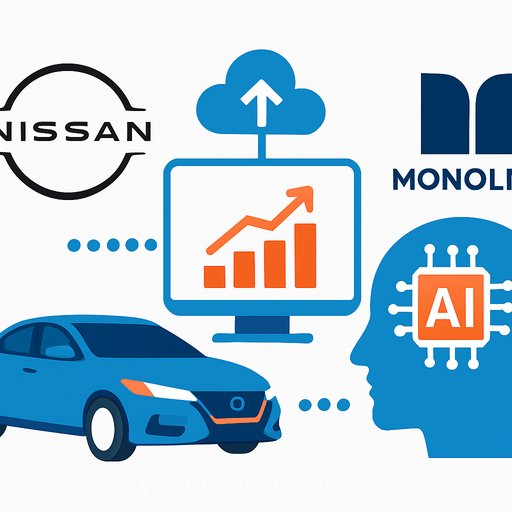Bringing vehicles to customers sooner: Nissan uses AI to speed physical tests
Nissan and Monolith have extended their strategic partnership through 2027 to reduce physical vehicle testing and compress development timelines. The collaboration supports RE:Nissan, the company's plan to get products to customers faster while improving operational efficiency.
First applied to the new, Sunderland-built Nissan LEAF, the approach is expanding across future European models. At Nissan Technical Centre Europe in Cranfield, engineers are applying machine learning to decades of test results to predict outcomes, cut prototype counts, and move decisions forward sooner.
What changed: from bolt joints to full programs
In one targeted project, AI models evaluated bolt joints in the vehicle chassis. The system recommended an optimal torque range and suggested which additional tests to run first, delivering a 17% reduction in physical testing versus the previous process.
Scaled across European programs, the same method could reduce test time by up to half. The result: fewer loops, faster validation, and more engineering hours spent on actual problem solving.
How the workflow looks
- Unify historical test data and simulation outputs with clear metadata and versioning.
- Train models to predict key performance metrics and pass/fail across conditions.
- Use tools like Next Test Recommender to prioritize the next best experiments and Anomaly Detector to flag outliers early.
- Replace a portion of physical runs with predictions, then confirm with targeted validation tests.
- Track hard metrics: percent test reduction, prototype count, time-to-decision, and defect escape rate.
Why it matters for product development
- Faster loops: fewer prototypes and shorter waits between iterations.
- Lower cost and resource use: less material, energy, and rig time, supporting sustainability goals.
- Sharper decisions: teams spend more time on edge cases, trade-offs, and design quality.
- Data as an asset: decades of test results become predictive models that scale across programs.
Emma Deutsch, Director of Customer Orientated Engineering and Test Operations at Nissan Technical Centre Europe, said the team is integrating AI-driven engineering software with extensive testing data to simulate and validate performance with precision. She noted this reduces reliance on physical prototypes, cuts development time and resource use, and strengthens Nissan's focus on innovation and sustainability. Looking ahead, AI will take an even more central role in how vehicles are designed, tested, and delivered to customers sooner.
Dr. Richard Ahlfeld, CEO and Founder of Monolith, said the company's mission is to equip engineers with AI tools that enable smarter, faster product development. He added that results with Nissan show how machine learning can drive efficiency and fresh thinking in automotive engineering, and that the partnership will continue.
Questions to pressure-test in your organization
- Do we have 5+ years of test data centralized with consistent labeling and traceability?
- Which test suites are repetitive, expensive, and safe to predict first?
- What is the smallest pilot that can prove a 10-20% test reduction in one quarter?
- How will we govern model drift, safety-critical cases, and compliance requirements?
- Which KPIs will show clear value to engineering, quality, and finance?
Get your team ready
If you're building similar capabilities-predictive testing, smarter experiment sequencing, and anomaly detection-consider focused upskilling for product and engineering teams. Explore role-based AI programs at Complete AI Training to speed up adoption and deliver measurable outcomes.
Your membership also unlocks:






